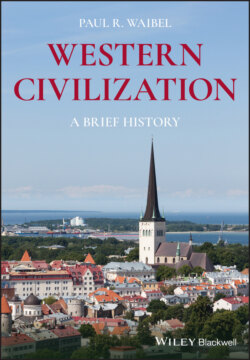Читать книгу Western Civilization - Paul R. Waibel - Страница 27
The Hellenistic Age (323–31 BC)
ОглавлениеShortly after his death Alexander's empire was divided among his leading generals. Alexander's mother Olympia was murdered in 316 BC. His wife Roxana, daughter of a Bactrian chief, and their son were both killed in 310 BC. Roxana had previously killed two of Alexander's other wives fearing they were a threat to her and her son. After dividing the administration of the empire among them, the generals fought one another until 281 BC, when three successor kingdoms were recognized. The Antigonids ruled Macedonia; the Seleucids ruled Asia Minor and Mesopotamia; the Ptolemies ruled Egypt.
During the Hellenistic Age, following the death of Alexander the Great, the independent city‐state that characterized the Hellenic Age was replaced by a cosmopolitan world of kingdoms and empires, all of which were permeated by Greek culture. Koine, a form of Greek, became the lingua franca throughout most of the Mediterranean world. Alexandria in Egypt, founded by Alexander the Great, became the economic and cultural center of the Mediterranean world. There, Hebrew scholars translated the Old Testament into Greek and began studying Greek philosophy. Historians began to write universal or world histories. The spread of Greek culture from the eastern Mediterranean to the Indus River was one of the great legacies of Hellenization. But this Hellenization remained only a thin veneer limited largely to the urban centers. Outside the cities, in the countryside, there was not even a veneer. There, the old ways remained dominate and the “world” did not extend beyond the immediate experience.
